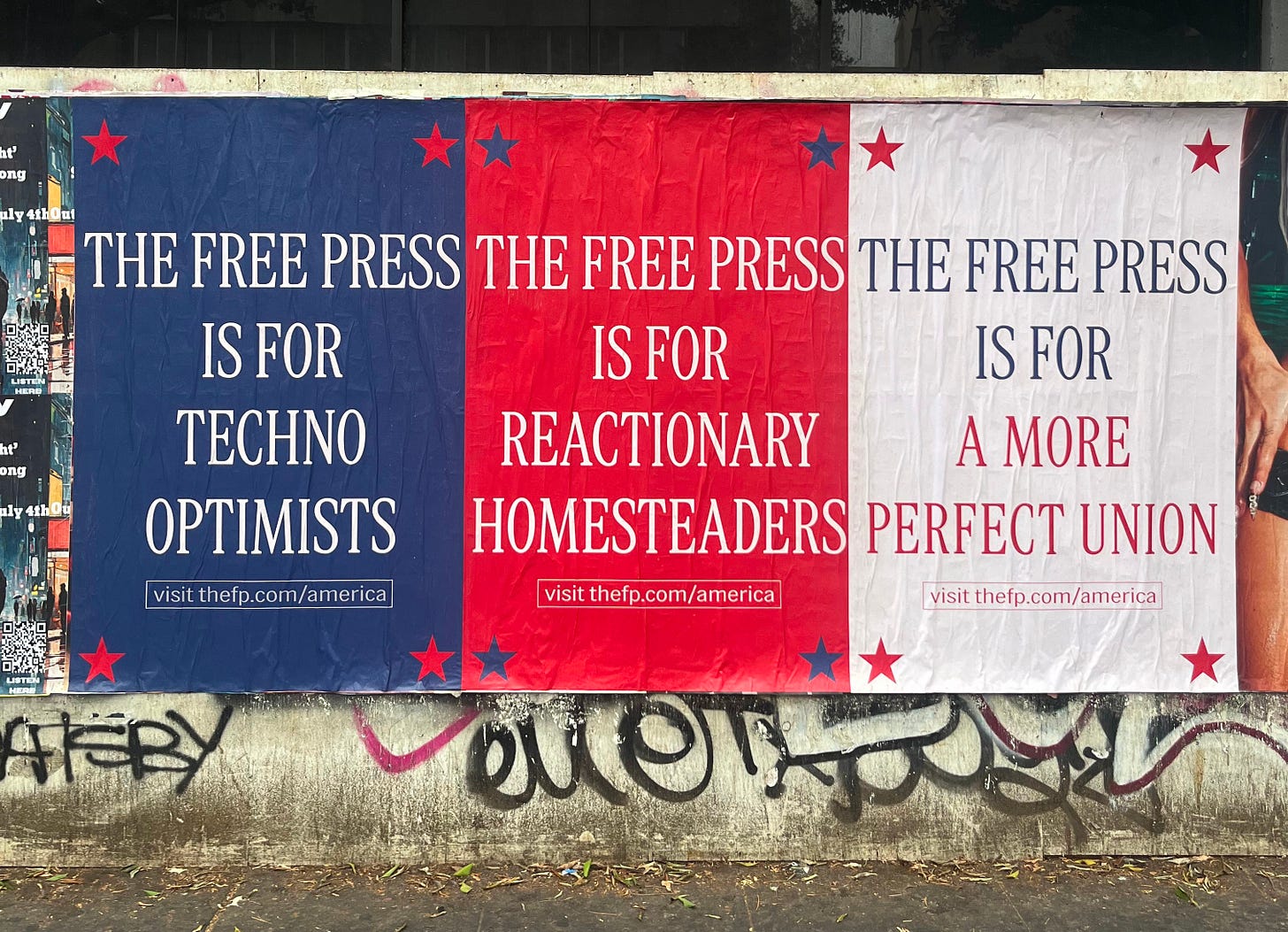How to be a stranger in a strange land
On exile, freedom ideologies and the independence of judgment.
A few weeks ago, I was on a morning walk through Koreatown in Los Angeles when I came across advertisements for Bari Weiss’ website The Free Press:
THE FREE PRESS IS FOR TECHNO OPTIMISTS
THE FREE PRESS IS FOR REACTIONARY HOMESTEADERS
THE FREE PRESS IS FOR A MORE PERFECT UNION
If the coded messaging wasn’t already a clue, the lanky serifs were also familiar from the Trump White House’s executive orders as the lapidary, in-your-face aesthetic of the new nationalist-conservative establishment. Weiss has now been reported to be shopping the Free Press at valuation of more than $200 million, with Skydance CEO and new Paramount owner David Ellison among the interested parties.
I’ve never been the target audience for this particular media enterprise, but we have to give unto Caesar what is Caesar’s due: The Free Press was early to spotting and cultivating the reactionary turn among American elites that snowballed over the past decade, culminating with Trump’s re-election last year. Wherever there were liberal orthodoxies to be resisted, they now seem everywhere in decline or defeat.
But standing on the sidewalk, I marveled at the hubris of a freedom-branded publication that need not bother sloganeering against the waves of masked men abducting my neighbors from the surrounding streets. The people getting disappeared into vans aren’t the target audience.
Life in power can strip you of clarity as a writer, and one of the few positive things to be said for conditions of exile are their remarkable ability to sharpen the powers of perspective. The great perceiver Sigmund Freud, bewildered why antisemitism should preclude him from being treated as fully “German” as a university student in 1873, found that alienation had its productive purposes. “Early in life I became familiar with the lot of standing among the opposition and being placed under a ban by the 'compact majority,’” Freud recalled later. “This laid the foundation for a certain independence of judgment."
It’s a lesson being inflicted on grad students getting disappeared by masked men for writing op-eds about Gaza in the student newspaper. “As a ‘detainee,’ I not only endured my struggles but also had the privilege of connecting with remarkable women who shared their stories with me,” Tufts University doctoral student Rümeysa Öztürk wrote in Vanity Fair of her 45 days in detention with immigrants from around the world. “Their experiences opened my eyes to a new realm of humanitarian crisis, expanding the circle of grief and compassion in my heart.”
Liberalism, in both the American and Enlightenment connotations of the word, has been downgraded by the “compact majority” from a ruling principle to a resistance ideology. But I can’t help but notice that liberalism is missing its historical revolutionary vitality after so many years in power, as if struggling to fit into an old suit after putting on a few too many pounds in middle age. Maybe its own time in the anti-establishment is necessary to help it get back into fighting shape, ideally better than before.
Sounds like a job for the exiled writer to me. By definition, there is no “free” press of the governors — only the governed.



Wow. Thanks for writing this Matt. You just can't take your freedom for granted. Even in the land of the free
If anyone fits the definition of an exiled writer it's Bari Weiss. But keep on not getting it.